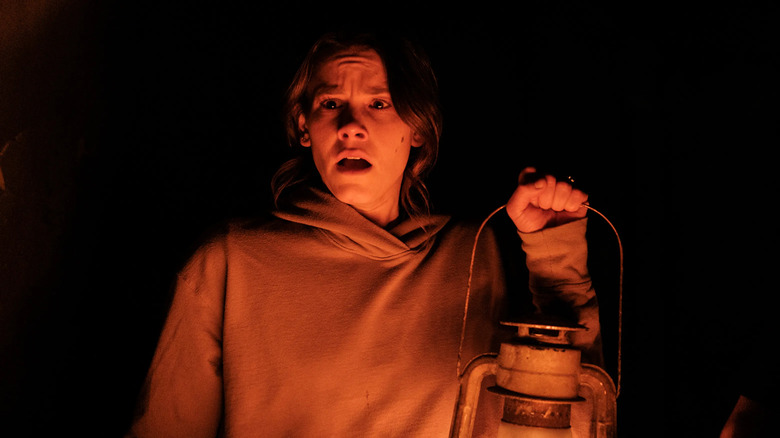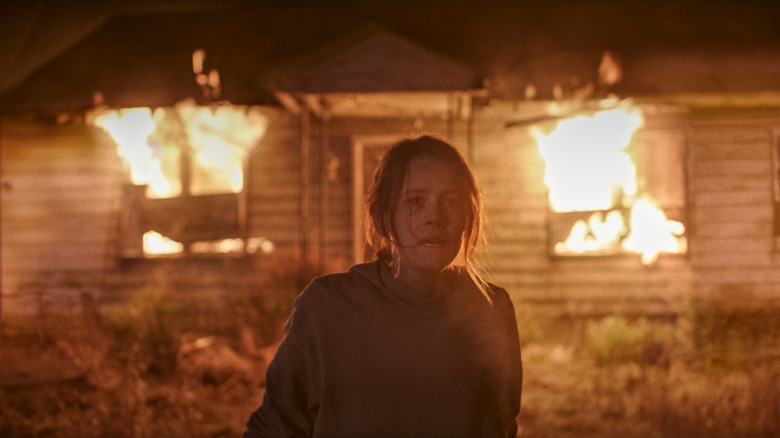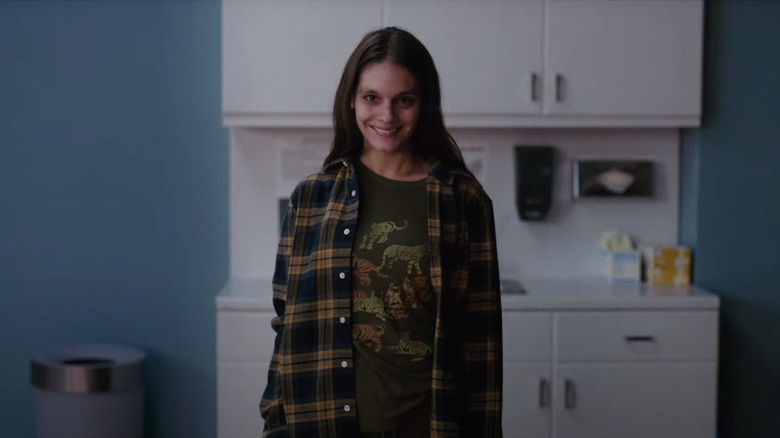Smile's Shocking Ending Was Always Part Of The Plan [Exclusive]
Warning: This post will contain spoilers for the 2022 film "Smile."
Parker Finn's new horror film "Smile" features an unseen demon — a malevolent force that can take the form of any person — that perpetuates itself through trauma. It takes possession of its victims and occupies their minds for about a week, inflicting horrifying hallucinations. In most cases, the demon's victims see — and can have full conversations with — smiling friends. The smile is key. At the end of the demon's tenure inside its host body, it forces them to die by suicide in front of another person. The demon will force its victim to smile while doing its violent deeds. The new witness, being traumatized by the violent death they just saw, will, in turn, be infected by the demon. The new witness will then also experience hallucinations and will inexorably march toward their own bloody end, also in front of a witness, etc. The cycle can continue indefinitely.
The demon is, of course, a metaphor for trauma, and "Smile" is about how cycles of violence are random and unceasing. The human mind is not capable of witnessing strange, random, violent death, and doing so will leave even the staunchest of souls marked.
By the end of "Smile," the film's protagonist Rose (Sosie Bacon), infected with the demon, will become savvy to the way it operates. She resolves to lock herself into her very, very remote childhood home, face her own personal demons, and — should she be forced into a violent end — remain unwitnessed, ending the demonic reign of terror. Sadly, a cop friend of hers (Kyle Gallner) will find her hiding place, giving the demon someone to pass into.
The bad ending
The final scenes of "Smile" features a physical manifestation of Rose's childhood trauma involving her late mother — as a girl, Rose witnessed her mother die — and there's a supernatural scrape. "Smile," curiously, is one of three recent films to feature an eight-foot-tall older woman as its monster ("It: Chapter Two" and "Barbarian" are the others). As her childhood home symbolically and literally burns down, her friend charges in to help. The demon sees its opportunity, and forces Rose to self-immolate. The film's final shot is a reflection of Rose's burning body reflected in Kyle Gallner's eyes.
In a recent interview with /Film's own Lex Briscuso, Parker talked about the ending, saying that the bleak inevitability of the demon's triumph was his plan from the start. This wasn't, he said, going to end well for anyone. That sort of ending was natural for a film about the endless cycle of trauma. In his words:
"I knew from early on that the film was going to eventually wind up at its worst possible conclusion. That was always baked into the DNA of the story because it felt like there was just a chance to not necessarily do the thing that maybe audiences are hoping for, that it felt like it was earned through the plot and through the themes of the film."
Smile II, Smile III, Smile IV, ad infinitum
Indeed, a cathartic escape, for a film like "Smile," would have felt cheap. "Smile" was released, a sociologist might say, into a pessimistic world. A happy ending in the current horror marketplace would have made the film's unusual, self-perpetuating premise seem churlish and disingenuous.
Parker admits he didn't always have a clear path to his end, but he knew the destination. He said:
"[T]here were a lot of different ways that the film was potentially going to get there. I considered a few different routes early on, but at a certain point it got kind of solidified and that was definitely something that was in the script from an early stage."
Of course, with a theme of infinite horror, it seems that a "Smile II" may be inevitable. The cycle will be discovered by someone new, and they too will find that it cannot be broken. Although there may be one way out via murder. Rob Morgan plays a man who has been in prison for many years, finding that he could pass trauma onto someone else by killing someone else instead of himself. Of course, that introduces a new ethical conundrum: does one commit murder to save themselves, knowing that the cycle would continue regardless?
An ambitious sequel to "Smile" could conceivably take the film's events into the distant future. Fast-forward several generations and see what the demon is doing in 2250. The go forward another millennium. Then another. The final human on Earth is now infected. The demon dies alone. This seems to be the logical end of the demon in the "Smile" universe.


